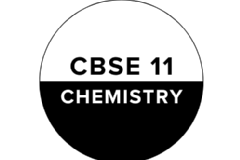In this course, we will be covering-
1. All the Chapters of Class 11th Chemistry for School exams.
2. Question Practice for each Chapter
3. Sample Paper for Exam Preparation.
Class 11 Chemistry - All Chapters
Chapter 1 - Some Basic Concepts of Chemistry
Chapter 2 - Structure of Atom
Chapter 3 - Classification of Elements and Periodicity in Properties
Chapter 4 - Chemical Bonding and Molecular Structure
Chapter 5 - States of Matter
Chapter 6 - Thermodynamics
Chapter 7 - Equilibrium
Chapter 8 - Redox Reactions
Chapter 9 - Hydrogen
Chapter 10 - The s-Block Elements
Chapter 11 - The p-Block Elements
Chapter 12 - Organic Chemistry - Some Basic Principles and Techniques
Chapter 13 - Hydrocarbons
Chapter 14 - Environmental Chemistry
Unit 1: Some Basic Concepts of Chemistry
Introducing the subjects of advanced chemistry to the students, this unit of the class 11 chemistry syllabus teaches the students about the following topics:
- Importance and scope of chemistry
- Laws of chemical combination
- Dalton’s atomic theory
- Atomic and molecular masses
- Concept of mole
- Stoichiometry and the calculations based on it.
Unit 2: Structure of Atom
Given below is the list of eminent chapters under this unit of the class 11 chemistry syllabus
- Bohr’s model and limitations
- Broglie’s relationship
- Dual nature of matter and light
- Electronic configuration of atoms
- Quantum numbers
- Aufbau principle
Familiarizing the students with the concepts of periodic tables, this unit of the class 11 chemistry syllabus includes the following:
- Modern periodic law and its present form
- Periodic trends in properties of elements (atomic radii, ionic radii, electronic gain enthalpy, electronegativity)
- Nomenclature of elements with atomic numbers more than 100
Given below are the essential topics covered under the fourth unit of the class 11 chemistry syllabus.
- Valence electrons
- Lewis structure
- VSEPR theory
- Hybridization
- Molecular orbital theory of homonuclear diatomic molecules
The fifth unit of the class 11 chemistry syllabus acquaints the students about the matter and various laws through the topics below.
- The three states of matter (types of bonding, intermolecular interactions, boiling and melting points)
- Gay Lussac’s law
- Boyle’s law
- Avogadro’s number
- Liquefaction of gases
- Viscosity and surface tension
Explaining all three laws of thermodynamics, the CBSE class 11 chemistry syllabus includes the following essential topics.
- Systems- concept and types
- First, second and third laws of thermodynamics
This unit emphasizes the students about concepts of equilibrium by teaching them the following topics in the class 11 chemistry syllabus.
- Equilibrium in chemical and physical processes
- Dynamic nature of equilibrium
- Le Chatelier’s principle
- Henderson equation
- Buffer solution
Unit 8: Redox Reactions
Here is everything the students need to know about redox reactions through this unit of the class 11 chemistry syllabus
- Concept of oxidation and reduction
- Balancing redox reactions
- Applications of redox reactions
Putting a detailed glimpse of Hydrogen, this unit of the class 11 chemistry syllabus includes:
- Position of hydrogen in the periodic table, isotopes, occurrence
- Uses and properties of hydrogen
- Hydrogen peroxide (structure, reaction and preparation)
- Hydrogen as a fuel
The students will be made aware of the s-Block elements through these topics of the class 11 chemistry syllabus below:
- General introduction of Group 1 and Group 2 elements
- Electronic configuration
- Trends in chemical reactivity with oxygen
- Properties and preparations of compounds ( sodium chloride, sodium hydrogen carbonate, sodium hydroxide)
- Biological importance of potassium and sodium
- Industrial uses of calcium oxide and calcium carbonate
Teaching the students about group 13 and group 14 elements, this unit of class 11 chemistry syllabus incorporates:
- Group 13 elements and Group 14 (occurrence, electronic configuration, oxidation states, etc.)
- Physical and chemical properties of Boron and its compounds
- Carbon-catenation
- Allotropic forms
The twelfth unit of the class 11 chemistry syllabus introduces the students to the basics of organic chemistry through a multitude of the following topics.
- Organic compounds (introduction, quantitative and qualitative analysis, methods of purification, classification and nomenclature)
- Electronic displacements in a covalent bond
- Homolytic and heterolytic fission of a covalent bond
- Types of organic reactions
- Resonance and hyperconjugation
Unit 13: Hydrocarbons
Students are taught about the different types of hydrocarbons through this unit of chemistry syllabus.
- Classification of hydrocarbons
- Aliphatic Hydrocarbons
- Alkanes (isomerism, conformation, chemical reactions, physical properties)
- Alkenes (structure of the double bond, geometrical isomerism, preparation methods, chemical reactions)
- Alkynes (structure of the triple bond, chemical reactions, physical properties, preparation methods)
- Aromatic Hydrocarbons
- Friedel Craft’s alkylation and acylation
In the advent of increasing environmental concerns, the students will be made aware of various aspects of the environment with a view of chemistry.
- Environmental pollution
- Chemical reactions in the environment
- Greenhouse effect and global warming
- Atmospheric pollutants
- Green chemistry as an alternative tool for combating pollution








